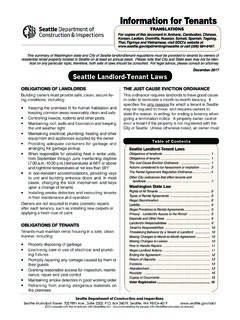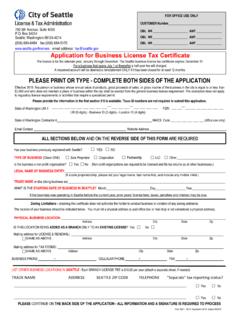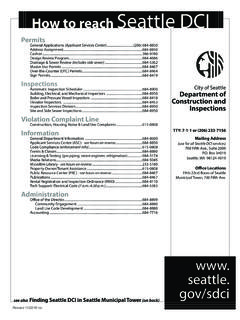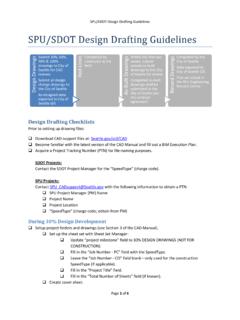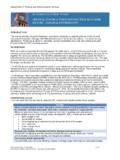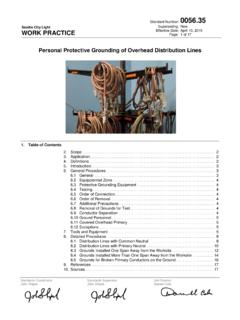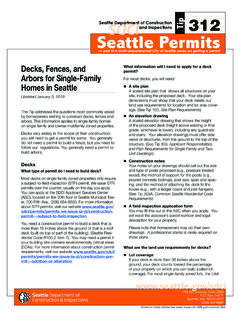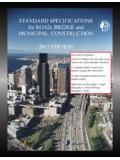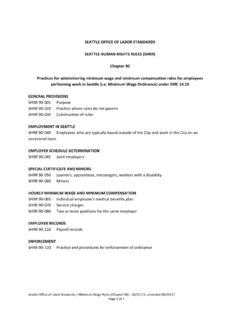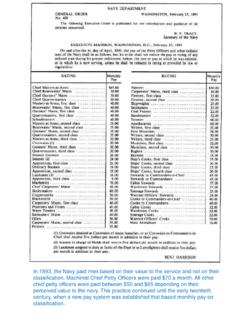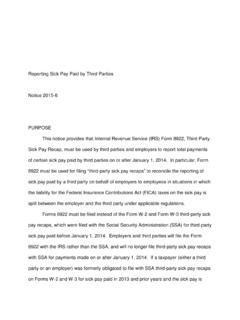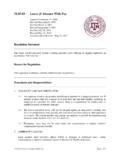Transcription of Seattle Paid Sick and Safe Time Ordinance
1 Seattle paid sick and safe time Ordinance Overview Begins on September 1, 2012. Provides paid sick and safe time (PSST) for employees working within Seattle City limits. Sets minimum requirements for accrual, use, and carryover of PSST. Requires employer notification and tracking of PSST. Offers basic job protections for employees who use PSST. New law is enforced by Seattle Office for Civil Rights. What is PSST? sick time can be used for: Personal illness or preventative care. Care for a family member s illness or preventative care (child, grandparent, parent, parent-in-law, spouse and registered domestic partner).
2 safe time can be used for: Survivors of domestic violence, sexual assault or stalking. Closure of workplace or child s school or place of care by public official to limit exposure to infectious agent, biological toxin or hazardous material. Who is covered? Employees who perform work in Seattle : Full- time , part- time , temporary, and occasional-basis employees. Employees who telecommute in Seattle . Employees who stop in Seattle as a purpose of their work. Excludes: Federal, state, or county government employers Employees who work or telecommute outside of Seattle .
3 Employees who travel through Seattle . Students enrolled in a work study program. Two year exemption for new small and medium-sized employers (Tier 1 and Tier 2) General Information Small (Tier 1) Employer Medium (Tier 2) Employer Large (Tier 3) Employer Full time Equivalents (FTEs) More than 4-49 employees More than 49 to 249 employees 250 or more employees Accrual of paid sick / safe time 1 hour / 40 hours worked 1 hour / 40 hours worked 1 hour / 30 hours worked Use of paid sick / safe time 40 hours / calendar year 56 hours / calendar year 72 hours / calendar year Carryover of unused paid sick / safe time 40 hours / calendar year 56 hours / calendar year 72 hours / calendar year Other facts: Accrual begins on September 1, 2012 or when the employee is hired after this date.
4 Accrual based on hours worked in Seattle including overtime for non-exempt employees. Accrual for occasional employees begins after they have worked 240 hours in a calendar year. Accrual begins on the 241st hour; employees are covered for current and following calendar year. Use begins after 180th calendar day from the beginning of employment. Hour-long increments: PSST can be used in hour-long increments. Carry-over: Employees permitted to carry over unused hours to the next calendar year. Frontloading permitted for accrual, use and carry over. Combined or universal leave (aka Personal time Off / PTO) policies are permitted, provided they comply with the PSST Ordinance .
5 Cash out option: If employer allows, employees have the voluntary option to cash out unused PSST. Rate of pay: Same hourly wage that employee would have earned during time PSST was taken. Excludes lost tips and commissions that employee might have received when PSST was taken. No waivers: Employees cannot waive their right to PSST (except collective bargaining agreements). Separation from employment: PSST reinstated if an employee is rehired within 7 months by the same employer. Other laws: Ordinance does not preempt or limit application of federal, state or other local laws.
6 Other laws: PSST can be coordinated with other leave laws such as FMLA, Domestic Violence Leave, Workers Compensation etc. How does an employee request use of PSST? Foreseeable leave: A written request at least 10 days in advance of leave (unless employer s policy requires less notice.) Unforeseeable leave: Give notice as soon as practicable (in compliance with the employer s policy for unforeseeable leave). paid safe time : end of first day of for domestic violence, sexual assault or stalking. Employer policies: Employer can require employees to follow their rules about giving notice.
7 Employee documentation for use of PSST: 1-3 consecutive days: Employee not required to provide documentation. More than 3 consecutive days: Employer may require documentation ( statement from healthcare professional that sick time was necessary). Clear instance or pattern of abuse: Employer may ask for documentation for absences that are shorter than 3 days. Privacy: Employer cannot require statement regarding the nature of the illness or other private medical information (but FMLA and ADA may apply and permit such inquiries). Payment for documentation: If employer does not offer health insurance: Employer and employee each pay 50% of the cost to obtain documentation (services by health care professionals and facilities, prescribed testing and transportation service providers).
8 If employee declined health insurance: Employee is not entitled to reimbursement. paid safe time for domestic violence, sexual assault or stalking: Police report. Court order. Documentation that the employee or employee s family member is experiencing domestic violence, sexual assault, or stalking. Employee s written statement is acceptable documentation by itself. Confidential no explanation required of the nature of the situation or reason for taking leave. PSST and employer attendance policies: Absence control policies: PSST cannot be counted as an absence that may result in discipline.
9 Clear instance or pattern of abuse: Employer can take reasonable action ( discipline) for: Repeated absences. Absences that precede or follow regular days off, or some other pattern without valid reason. Obtaining or using paid sick time improperly. PSST notice and record-keeping requirements: Notice: employers are required to provide notice to all employees who work in Seattle , regardless of employer tier size or location. Notice must be: Conspicuous and accessible. Physical and/or electronic. Notification: Employers must provide notification of available PSST each time wages are paid : By paystub and/or online.
10 Record keeping: Employers must retain PSST records for two years that indicate: Employee hours worked in Seattle . Accrued PSST by employee. Use of PSST by employee. Retaliation protection Retaliation is illegal. Employers are prohibited from disciplining or discriminating against employees who have exercised their rights under the Ordinance . Employee and third-party complaints are permitted. Broad protection against retaliation: Anti-retaliation provision applies to ALL employers with one or more employees. Collective Bargaining Agreements (CBA): Waiver of rights is permitted: In CBA or MOA (Memorandum of Agreement).
